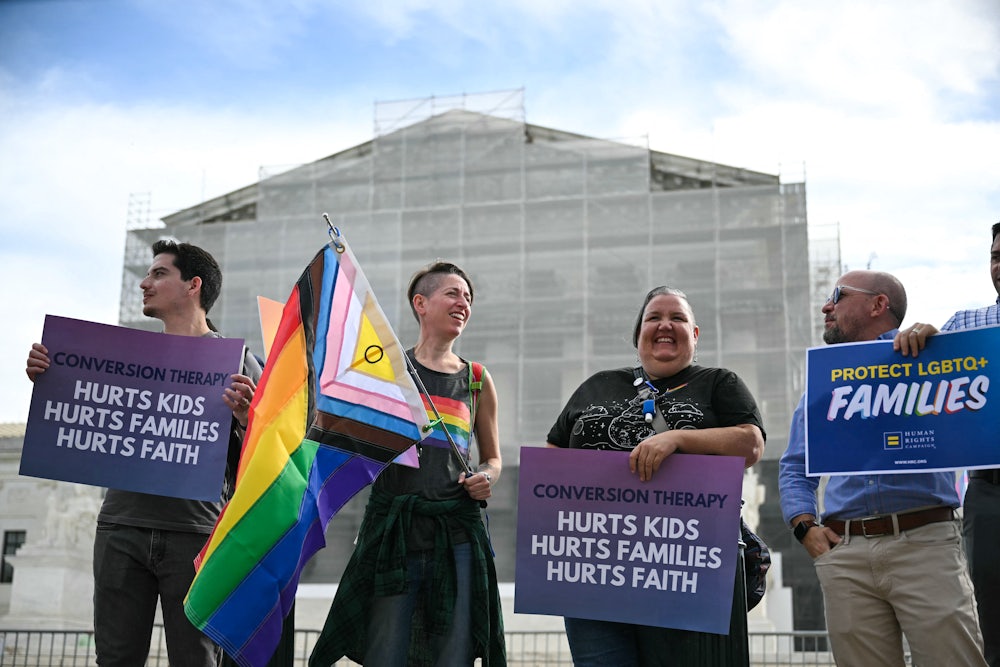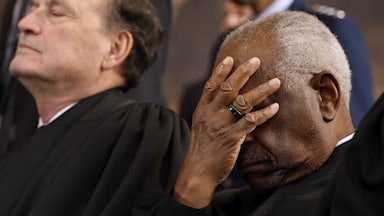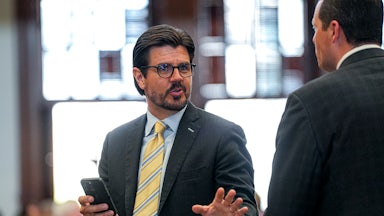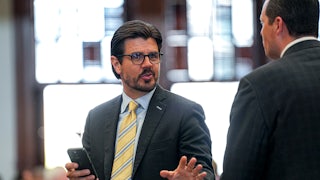Thursday’s oral arguments in Chiles v. Salazar were a textbook example of how the Supreme Court’s conservative majority, when it’s aligned with right-wing legal groups, never fails to frame cases, laws, and issues in topsy-turvy ways.
“There is irreparable harm going on right now,” attorney James Campbell, who argued on behalf of Chiles, said in response to a question from Justice Ketanji Brown Jackson. “Miss Chiles is being silenced. The kids and the families who want this kind of help that she’ll offer are being left without any support.”
The “help” to which she referred is conversion therapy, a discredited treatment that seeks to change a person’s sexual orientation or gender identity. More than 20 states have enacted some form of ban on it. Major medical organizations have unanimously said that these “therapies” are not only ineffective and unsupported by scientific evidence but can do immense psychological harm to gay and transgender patients.
The Supreme Court now appears skeptical of bans on the practice. The conservative justices in the majority appeared to sympathize with a counselor who claimed that Colorado’s ban on conversion therapy violates her First Amendment rights to free speech. Among them was Justice Samuel Alito, who suggested that the state must treat therapists who practice conversion therapy on equal terms with those who help LGBTQ youth come to terms with their identity and/or orientation.
Alito posited a hypothetical scenario where one gay adolescent man “says he’s attracted to other males, feels uneasy and guilty about those feelings, and he wants the therapist’s help so he will feel comfortable as a gay young man,” and another scenario where the same young man “wants to end or lessen them, and he asks for the therapist’s help in doing so.”
“It seems to me your statute dictates opposite results in those two situations based on the viewpoint expressed,” he concluded. Viewpoint discrimination rarely survives judicial scrutiny when challenged under the First Amendment. Alito’s framework, if adopted by the court, would effectively decide the case in Chiles’s favor. It is also based on an impractical and unrealistic view of the issue.
“The harms from conversion therapy come from when you tell a young person you can change this innate thing about yourself, and they try and they try and they fail, and then they have shame and they’re miserable, and then it ruins their relationships with their family,” Shannon Stevenson, the solicitor general of Colorado, told the justices. Increases in depression, self-harm, and suicidality can often follow.
If the Supreme Court strikes down conversion-therapy bans, the results will be dire for gay and transgender Americans who will feel pressured by their families and/or communities to engage in dangerous and unscientific “treatments.” More ominously, such a ruling could also form the spear tip of a much broader assault on LGBTQ rights as they currently stand.
The case comes from Kaley Chiles, a licensed counselor in Colorado Springs with a master’s degree in clinical mental health. She practices talk therapy and does not prescribe medications or other medical treatments. The conflict arises from the fact that her religious beliefs are inextricably linked to her therapeutic practices. “Chiles views her work as an outgrowth of her Christian faith,” her lawyers told the court in their brief. “Many of her clients are also Christians who seek her help because of their shared religious beliefs.”
Among those whom Chiles treats are, in her words, “young people with various mental-health struggles, including issues related to trauma, personality disorders, addiction, eating disorders, gender dysphoria, and sexuality.” Some of those young clients “desire counseling—sometimes based on their faith—‘to reduce or eliminate unwanted sexual attractions, change sexual behaviors, or grow in the experience of harmony with [their] physical body,’” she told the court, and she helps them pursue those “desires and objectives.”
In 2019, Colorado enacted a law that banned conversion therapy for minors. Licensed therapists and other medical professionals in the state who use treatments that attempt to change a child’s sexual orientation or gender identity can be punished with fines and disciplinary measures by the relevant medical boards. The law included exceptions for both religious ministers and for unlicensed counselors.
Chiles sued the state in 2022 with the support of Alliance Defending Freedom, or ADF, a right-wing Christian legal organization. A federal district court and the Tenth Circuit Court of Appeals both rejected her claims, concluding that Colorado acted well within its authority to regulate medical practices in the state. Chiles and ADF then urged the high court to intervene, framing her as a victim of government censorship.
“Colorado forbids counselors like Kaley Chiles from helping minors pursue state-disfavored goals on issues of gender and sexuality,” Campbell told the court. “This law prophylactically bans voluntary conversations, censoring widely held views on debated moral, religious, and scientific questions.” Hashim Mooppan, who argued on the Trump administration’s behalf, compared it to “prior restraint,” a phrase that is blasphemous in First Amendment contexts.
The state of Colorado strenuously opposed Chiles’s appeal. “If adopted, [Chiles’s] position would gut states’ power to ensure mental healthcare professionals comply with the standard of care,” the state warned in its brief for the court. “Moreover, because so much health care—regardless of the field—is delivered exclusively through words, [her] efforts to distinguish substandard treatment involving words from substandard treatment that does not involve words would destabilize longstanding and sensible healthcare regulation.”
Justice Amy Coney Barrett appeared to recognize that a ruling for Chiles would be incongruous with the court’s decision last term in United States v. Skrmetti, where the court’s conservative majority upheld a Tennessee law that banned gender-affirming care for transgender youth.
In Skrmetti, the court said that the challenged law only had to survive the extremely lenient standard of rational-basis review, which would doom Chiles’s challenge in this case. “Can a state pick a side?” Barrett asked Stevenson. “I want to be clear, it’s not that the medical community says we just don’t know. It’s that there are competing strands, and some states like, say, Tennessee, which was the state at issue in Skrmetti, picks one side, [and] Colorado picks another side.”
Chief Justice John Roberts, who wrote for the court in Skrmetti, appeared to be searching for a way to distinguish this case from that one. His questions for the lawyers focused on Chiles’s assertions that her therapeutic methods were purely speech-based and did not involve “conduct” like prescribing drugs or administering “treatments” like aversion therapy. That would theoretically allow the court to distinguish between purely verbal forms of conversion therapy and more dangerous pseudo-medical techniques.
Justice Brett Kavanaugh notably asked no questions during Thursday’s roughly 90-minute session. Justices Clarence Thomas and Neil Gorsuch appeared to lean in favor of siding with Chiles in full. But it was Alito who was the most forceful justice when it came to challenging Colorado’s law. Along the way, he also seemed to implicitly reject the notion of deferring to medical professionals’ expertise.
Among Alito’s questions for Colorado’s solicitor general were two troll-ish ones about past errors by the medical community. The implied point that he appeared to be making was that doctors have been wrong in the past, and they might be wrong now.
“Was there a time when many medical professionals thought that certain people should not be permitted to procreate because they had low IQs?” he asked. When Stevenson brushed off the question, he continued. “Was there a time when there were many medical professionals who thought that every child born with Down syndrome should be immediately put in an institution?” Alito asked.
If Alito meant for this to be remotely persuasive, then it didn’t work. One of the greatest moral and constitutional failures in the high court’s history is when it embraced eugenics in the 1927 case Buck v. Bell. “Three generations of imbeciles is enough,” Justice Oliver Wendell Holmes infamously wrote for the court in the decision, which upheld the compulsory sterilization of an intellectually disabled woman. (Alito even paraphrased that statement at one point in mockery.)
The Supreme Court’s ruling in Buck encouraged eugenicists to pursue similar strategies nationwide; the Virginia law in question even influenced Nazi racial policies. One could read Buck as a warning for the court to not endorse pseudoscientific medical treatments with a proven track record of harmful effects on ideological grounds. Alito’s implication appears to be that the court should avoid deferring to state officials on these medical questions as well if it implicates a fundamental right.
That line of reasoning (and the Buck comparison in general) only really makes sense if one thinks that conversion therapy is real and gay and transgender people, at least for constitutional purposes, are not. In its brief for Chiles, ADF attempted to slip a broader attack on LGBTQ rights into the case by arguing that sexual orientation and gender identity were mutable. “To deny and suppress the reality that gender identity and sexual orientation can change, Colorado put its licensing power to a speech-censoring use that’s inconsistent with history and tradition,” the group argued.
The overwhelming medical consensus is that sexual orientation is an immutable characteristic. To suggest otherwise, ADF paraphrased from an academic paper to assert that “respected researchers of LGBT issues have long observed that ‘longitudinal, population-based studies’ show ‘changes in the same-sex attractions of some individuals over time.’” Those scholars filed a friend-of-the-court brief to accuse ADF of profoundly misinterpreting and misquoting their work.
“That argument collapses two fundamentally different phenomena—naturally occurring fluidity and therapist-directed attempts to change sexual orientation—into a single concept, and it does so in direct opposition to the scientific record,” they argued. They also strenuously objected to using their work in support of conversion therapy, which they described as a “well-documented public-health threat.”
The problem goes beyond merely misrepresenting academic research to the court. While the Supreme Court delivered multiple victories for LGBTQ rights over the past quarter-century, it never took the step of recognizing sexual orientation as a “suspect classification” under the Fourteenth Amendment’s equal protection clause. Laws targeting other suspect classifications, like race and religion, receive the highest level of judicial scrutiny when challenged in court.
One prong in the court’s traditional test for identifying a suspect classification is whether or not the protected trait is an “immutable characteristic.” Three of the court’s conservatives—Thomas, Alito, and Barrett—said in Skrmetti that they would have upheld the Tennessee law because gender identity was not immutable and therefore failed the court’s traditional test. Their interpretation, which was not adopted by the court itself, would make it impossible for transgender Americans to challenge discriminatory laws against them on equal-protection grounds.
If ADF gets the court’s conservative majority to say that sexual orientation isn’t an immutable characteristic, even in passing, then it would be a significant reversal for LGBTQ rights in future cases. Congress and the states would still be able to enact antidiscrimination protections for gay and lesbian Americans by statute, but the doors of the courts would close in places where lawmakers took no such steps.
The Supreme Court can resolve this case on other grounds, and it most likely will. The question is whether it will lose sight of the real stakes in this case—the well-being of the LGBTQ youth who will be pressured by unsympathetic families and communities to “change” their sexual orientation or gender identity through unproven and unscientific “treatments”—or the broader implications that a ruling for the plaintiff could have for LGBTQ rights in general. A decision will likely come in the first half of next year.










